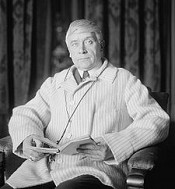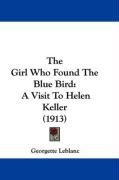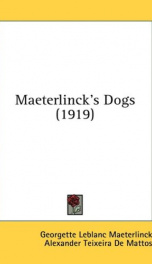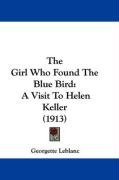Leblanc Georgette

Maurice Polydore Marie Bernard, Count Maeterlinck (Dutch pronunciation: [moˈʁis ˈmaˑtəʀlɪŋk]; 29 August 1862 - 6 May 1949) was a Belgian playwright, poet and essayist who wrote in French. He was awarded the Nobel Prize in Literature in 1911. The main themes in his work are death and the meaning of life. His plays form an important part of the Symbolist movement. Maeterlinck was born in Ghent, Belgium to a wealthy, French-speaking family. His father, Polydore, was a notary who enjoyed tending the hothouses on their property. His mother, Mathilde, came from a wealthy family.[1] In September 1874 he was sent to the Jesuit College of Sainte-Barbe, where works of the French Romantics were scorned and only plays on religious subjects were permitted. His experiences at this school influenced his distaste for the Catholic Church and organized religion.[2] He had written poems and short novels during his studies, but his father wanted him to go into law. After finishing his law studies at the University of Ghent in 1885, he spent a few months in Paris, France. He met some members of the new Symbolism movement, Villiers de l'Isle Adam in particular, who would have a great influence on Maeterlinck's subsequent work. He became famous overnight when his first play, Princess Maleine, received enthusiastic praise from Octave Mirbeau, the literary critic of Le Figaro (August 1890). In the following years, he wrote a series of symbolist plays characterized by fatalism and mysticism, most importantly Intruder (1890), The Blind (1890) and Pelléas and Mélisande (1892). He had a relationship with the singer and actress Georgette Leblanc from 1895 till 1918. Leblanc influenced his work for the following two decades. With the play Aglavaine and Sélysette Maeterlinck began to create characters, especially female characters, more in control of their destinies. Leblanc performed these female characters on stage. Even though mysticism and metaphysics influenced his work throughout his career, he slowly replaced his Symbolism with a more existential style.[3] In 1895, with his parents frowning upon his open relationship with an actress, Maeterlinck and Leblanc moved to the district of Passy in Paris. The Catholic Church was unwilling to grant her a divorce from her Spanish husband. They frequently entertained guests, including Mirbeau, Jean Lorrain, and Paul Fort. They spent their summers in Normandy. During this period, Maeterlinck published his Twelve Songs (1896), The Treasure of the Humble (1896), The Life of the Bee (1901), and Ariadne and Bluebeard (1902).[3] In 1903, Maeterlinck received the Triennial Prize for Dramatic Literature from the Belgian government.[4] In 1906, Maeterlinck and Leblanc moved to a villa in Grasse. He spent his hours meditating and walking. As he emotionally pulled away from Leblanc, he entered a state of depression. Diagnosed with neurasthenia, he rented the Benedictine Abbey of St. Wandrille in Normandy to help him relax. Leblanc would often walk around in the dress of an abbess; he would wear roller skates as he moved about the house.[5] During this time, he wrote his essay "The Intelligence of Flowers" (1906), in which he discussed politics and championed socialist ideas. He donated money to many workers' unions and socialist groups. At this time he conceived his greatest contemporary success: the fairy play The Blue Bird (1908). He also wrote Marie-Victoire (1907) and Mary Magdalene (1910) with lead roles for Leblanc.[6] With the exception of The Blue Bird, critics did not praise these plays and considered Leblanc no longer an inspiration to the playwright. Even though alfresco performances of some of his plays at St. Wandrille had been successful, Maeterlinck felt that he was losing his privacy. The death of his mother on 11 June 1910 added to his depression.[7] In 1910 he met the 18-year-old actress Renée Dahon during a rehearsal of The Blue Bird. She became his lighthearted companion. Winning the Nobel Prize for Literature served to heighten his spirits, as well. By 1913, he was more openly socialist and sided with the Belgian trade unions against the Catholic party during a strike.[8] He began to study mysticism and lambasted the Catholic church in his essays for misconstruing the history of the universe.[9] By a decree of 26 January 1914, his opera omnia were placed on the Index Librorum Prohibitorum by the Roman Catholic Church. When Germany invaded Belgium in 1914, Maeterlink wished to join the French Foreign Legion, but his application was denied due to his age. He and Leblanc decided to leave Grasse for a villa near Nice, where he spent the next decade of his life. He gave speeches on the bravery of the Belgian people and placed guilt upon all Germans for the war. While in Nice he wrote The Mayor of Stilmonde, which was quickly labeled by the American press as a "Great War Play." He also wrote The Betrothal, a sequel to The Blue Bird, in which the heroine of the play is clearly not a Leblanc archetype.[10] On 15 February 1919 Maeterlinck married Dahon. He accepted an invitation to the United States. Samuel Goldwyn asked him to produce a few scenarios for film. Only two of Maeterlinck's submissions still exist; Goldwyn didn't use any of them. Maeterlinck had prepared one based on his The Life of a Bee. After reading the first few pages Goldwyn burst out of his office, exclaiming: "My God! The hero is a bee!" By the 1920s, Maeterlinck found himself no longer in tune with the times. His plays of this period (The Power of the Dead, The Great Secret, Berniquel) received little attention. Dahon gave birth to a stillborn child in 1925. In 1926 Maeterlinck published La Vie des Termites (The Life of the White Ant), an entomological book that plagiarised the book The Soul of the White Ant, researched and written by the South African poet and scientist Eugene Marais,[11] in what has been called "a classic example of academic plagiarism" by University of London's Professor of Biology, David Bignell.[12] Marais accused Maeterlinck of having used his concept of the "organic unity" of the termitary in his book.[13] Marais had published his ideas on the termitary in the South African Afrikaans-language press, both in Die Burger in January 1923 and in Huisgenoot, which featured a series of articles on termites under the title "Die Siel van die Mier" (The Soul of the White Ant) from 1925 to 1926. Maeterlinck's book, with almost identical content,[12] was published in 1926. Maeterlinck was able to commit the plagiarism because he was Belgian and, though his mother tongue was French, he was fluent in Dutch, from which Afrikaans was derived. It was common at the time for worthy articles published in Afrikaans to be reproduced in Flemish and Dutch magazines and journals. Supported by a coterie of Afrikaner Nationalist friends, Marais sought justice through the South African press and attempted an international lawsuit. This was to prove financially impossible and the case was not pursued. However, Marais gained a measure of renown as the aggrieved party, and as an Afrikaner researcher who had opened himself up to plagiarism because he published in Afrikaans out of national loyalty. Marais brooded at the time of the scandal, "I wonder whether Maeterlinck blushes when he reads such things [critical acclaim], and whether he gives a thought to the injustice he does to the unknown Boer worker?"[13] Maeterlinck's own words in The Life of the Termite indicate that the possible discovery or accusation of plagiarism worried him: It would have been easy, in regard to every statement, to allow the text to bristle with footnotes and references. In some chapters there is not a sentence but would have clamoured for these; and the letterpress would have been swallowed up by vast masses of comment, like one of those dreadful books we hated so much at school. There is a short bibliography at the end of the volume which will no doubt serve the same purpose. Despite these misgivings, there is no reference to Eugene Marais in the bibliography. Maeterlinck's other works on entomology include The Glass Spider (1923) and The Life of the Ant (1930). Marais' biographer, Leon Rousseau, attributed Marais' later suicide to this act of plagiarism and theft of intellectual property by Maeterlinck.[14] In 1930 he bought a château in Nice, France, and named it Orlamonde, a name occurring in his work Quinze Chansons. He was made a count by Albert I, King of the Belgians in 1932. According to an article published in the New York Times in 1940, he arrived in the United States from Lisbon on the Greek Liner Nea Hellas. He had fled to Lisbon in order to escape the Nazi invasion of both Belgium and France. The Times quoted him as saying, "I knew that if I was captured by the Germans I would be shot at once, since I have always been counted as an enemy of Germany because of my play, The Mayor of Stilmonde, which dealt with the conditions in Belgium during the German Occupation of 1918." As with his earlier visit to America, he still found Americans too casual, friendly and Francophilic for his taste.[15]. He returned to Nice after the war on 10 August 1947. In 1948, the French Academy awarded him the Medal for the French Language. He died in Nice on 6 May 1949 after suffering a heart attack. There was no priest at his funeral. Maeterlinck, an avid reader of Arthur Schopenhauer, considered man powerless against the forces of fate. He believed that any actor, due to the hindrance of physical mannerisms and expressions, would inadequately portray the symbolic figures of his plays. He concluded that marionettes were an excellent alternative. Guided by strings operated by a puppeteer, Maeterlinck considered marionettes an excellent representation of fate's complete control over man. He wrote Interior, The Death of Tintagiles, and Alladine and Palomides for marionette theatre.[16] From this, he gradually developed his notion of the "static drama." He felt that it was the artist's responsibility to create something that did not express human emotions but rather the external forces that compel people.[17] Materlinck once wrote that "the stage is a place where works of art are extinguished. [...] Poems die when living people get into them."[18]
do you like this author?
What readers are saying
What do you think? Write your own comment on this book!
write a commentWhat readers are saying
What do you think? Write your own comment on this author!
write a commentBook list

The Blue Bird for ChildrenThe Wonderful Adventures of Tyltyl and Mytyl in Search of Happiness
Series:
Unknown
Year:
Unknown
Raiting:
2.5/5
Show more
add to favoritesadd In favorites

the girl who found the blue bird a visit to helen keller
Series:
Unknown
Year:
Unknown
Raiting:
5/5
Show more
add to favoritesadd In favorites
Book list

The Blue Bird for ChildrenThe Wonderful Adventures of Tyltyl and Mytyl in Search of Happiness
Series:
Unknown
Year:
Unknown
Raiting:
2.5/5
Show more
add to favoritesadd In favorites

the girl who found the blue bird a visit to helen keller
Series:
Unknown
Year:
Unknown
Raiting:
5/5
Show more
add to favoritesadd In favorites

maeterlincks dogs
Series:
Unknown
Year:
Unknown
Raiting:
3/5
MAETERLINCKS DOGS - 1919 - INTRODUCTION - 0UR dogs Faithful companions of a life which they venerate without understanding Indulgent friends, whose constant adoration compels the affection of the most unwilling Are we so greedy of love that we needs must cherish and encourage the offering of these poor unconscious hearts Are we so athirst for domination that it pleases us to play towards these ingenuous minds the part of a god dispensing punishments and favours We understand the watch-dog, the guardian who lies awake in the darkness, to signal the approach of intruders. Our hearts are touched by the devotion of the blind mans dog, by the self-abnegation of the pointer, the retriever. We respect the sheep-dog, who watches over the flock the dog of Flanders, who is the poor mans horse, carefully pursuing his strenuous calling and we marvel at the police-dog, who fulfils his noblest of all missions in seeking upon the battle-field the bodies of his immolated gods. But these worthy quadrupeds are in the canine world what officials, manufacturers, merchants, clergy and their like are in our human society, in a word, the I necessary cog-wheels of our community. Now, being neither a blind man nor a sportsman, neither a shepherd nor a soldier, I have been able to consider these deserving animals only from a distance and I shall speak merely of those who must, in their own world, be regarded as vagabonds, idlers, oddities, or philosophers, that is, as the riff-raff of canine society. Our dogs cultivated no other virtues than those of the heart and they understood how to make themselves beloved. In truth I cannot tell you why they were loved but do we ever know why we love and are we to be more exacting towards animals than towards These worthy quadrupeds mLqseuLp Suyqmoq qvyq JO qs yay pug oq qs day q oqu a 3u qsrpa uros laaelq qsnw I pue suorusduro, p j y q m 0 j I B 03 ajaezuoq op oq sa d asayq ur y s r I Osquaaa aq dr3qu. e . qou pnur aM qng l no sr . ay uaqM ur auro, 07 pue UI . sr . ay u a y q no OS oq pneio3 qdwold ayq pueqslapun oq npuqg I seal ay u nqa P UB sloop JO no OS Lay3 6 y o u y d uou ruo, sSuraq u. eruny J B J a3uala pp M squeuaq S y pue as apuo, E aqrun q ay ay un qou a n suo q q a m 0 amseaid a am sploge puv L lenuyquo3 am sqlnqsyp I B F U U E J a lo u I laAa Surylew sr s e a L 30 ssauiinj ayq w o y p u ag B a q n I se am appq sag o yp ne lof puapj LW uaur S30CI StX3NI X3. LZIVK X Idlers, oddi tics, or philosophers CONTENTS PAGE DEDICATION . a . V INTRODUCTION . . . vii CHAP I. LOUIS THE DEBONNAIRE . . I I I.. RAYMOND T HE CLOWN OR, THE CHILDRENS ENTERTAINER . 19 IV. ADHEMAR T HE MISUNDERSTOO . D 43 VI. GOLAUD THE SUPERDOG Adelaide . . . a a 125 Golauds Vocabulary . a . 127 Golauds Travelling-impressions . 129 Some of Golauds Home Impressions . 132 Golauds Views on Boxing . I35 Golauds Views on the War . . I45 VII. JULES THE SPONGER a 153 VIII. THE DEATH OF GOLAUD a . 165 IX. THE ANCESTOR O F THE KENNEL 173 xiii
Show more
add to favoritesadd In favorites

The Choice of Life
Series:
Unknown
Year:
Unknown
Raiting:
4.5/5
Translated by Alexander Teixeira de Mattos --This text refers to an alternate Paperback edition.
Show more
add to favoritesadd In favorites
What readers are saying
What do you think? Write your own comment on this author!
write a commentif you like Leblanc Georgette try:
readers also enjoyed
What readers are saying
What do you think? Write your own comment on this author!
write a commentGenre
if you like Leblanc Georgette try:
readers also enjoyed
Do you want to exchange books? It’s EASY!
Get registered and find other users who want to give their favourite books to good hands!


